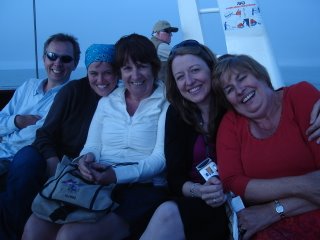Holidays

29th September 2006
Chas has been in Zambia for seven months without seeing an elephant, and this situation grieves him considerably. At the beginning of this week, he started agitating for a safari trip. It is now Friday afternoon and he and I are slumped in plastic chairs in the arrivals hall at Mfuwe airport with Mum and Petrie. We have been travelling since 5am this morning, and it is 380C in the shade. All the other tourists going to South Luangwa have been picked up already, but our driver is showing no inclination to take us anywhere, having disappeared to the bank half an hour ago. I am not certain how we ended up booking with the only local safari company that has to undertake such lengthy financial transactions. Chas made the reservation. I have a bad wife moment and consider reminding him of this.
Eventually the driver returns, so we clamber into the jeep, and set off down the road with hot air and dust blowing in our faces. Along the way, we see a herd of elephants in the bush, and Chas is suitably excited. We arrive at the camp, which sits on the edge of a swamp by the Luangwa river. Shortly afterwards, I am sitting in the swimming pool surveying the impala and vervet monkeys, and I spot a giraffe emerging from the bush and walking towards me. In a fit of giggles, I demand that Chas takes a photo of me in the water with the giraffe approaching, because I suspect that I will never have a moment like this again in my life and it must be commemorated quickly. I am very glad we came to this place.
6th October 2006
We have been in South Africa for five days. So far, negotiations regarding the daily outings have been protracted, but today we have unanimously agreed to go Robben Island. It’s something you can’t leave Cape Town without seeing, we all agree. We don’t really discuss why we feel this is the case. Probably it’s about feeling obliged to remind yourself of the ugly recent history of this beautiful place. And maybe the celebrity associations – like Graceland, but more politically sound. Also, my sister Linda has an unhealthy obsession with prisons.
Chas and I are a bit late for the ferry, having been distracted by a gourmet burger outlet en route to the terminal, and the upper deck is already full of other foreign tourists. We sit downstairs, next to a group of elderly black women who are travelling together. They look like they are having a grand day out. Coming here probably means something entirely different for them.
We are shown around the prison by a former political prisoner, who gives a dignified and restrained account of his incarceration. It is moving stuff. He asks us if we would like to ask any questions before seeing the rest of the buildings. A miserable-looking British woman says “When does the ferry leave? I need to be back by five.” He reassures her there is plenty of time, and we move on to view Comrade Mandela’s cell. I look at the urine bucket through the bars, and am reminded of my first day in Zambia, when VSO took us to Kenneth Kaunda’s former house, and we all squeezed into the bedroom to gaze at his stained mattress.
In the end, the tour goes on longer than scheduled and we miss our return ferry. The miserable woman is apoplectic. She complains loudly about our guide to one of the staff members at the quayside. Linda rolls her eyes. “She’d have him locked up again…” It does seem slightly churlish to complain about being detained on this island for an extra half hour, given that Mandela was stuck here for eighteen years. I ignore her, and instead take some photos of Chas, former anti-apartheid protester, standing outside the prison wall with his hand raised in a not completely ironic victory salute.
